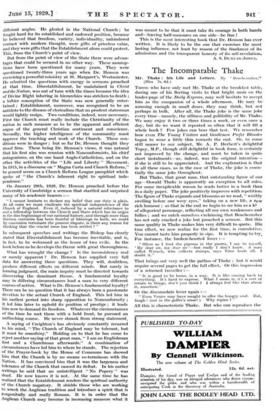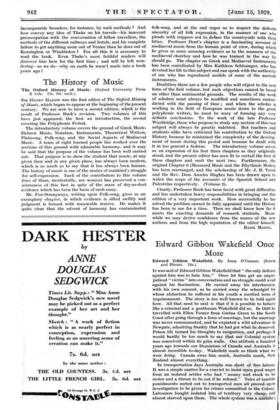The Incomparable Thake
Mr. Make : his Life and Letters. By " Beachcombe0 (Bles 75. 6d.) Mr. Make : his Life and Letters. By " Beachcombe0 (Bles 75. 6d.) THOSE who have only met Mr. Thake at the breakfast table, during one of his fleeting visits to that bright oasis on the leader-page of the Daily Express, may well hesitate to accept him as the companion of a whole afternoon. He may be:
amusing enough in small doses, they may think, but not perhaps in bulk. After all, the Thake joke is the same joke every time—namely, the silliness and gullibility of Mr. Thake. We may enjoy it two or three times a week, or even once a
day, but do we want it repeated so often that it will fill a- whole book ? Few jokes can bear that test. We remember how even The Young Visiters and Gentlemen Prefer Blondes
began to wear a little thin towards the end. Or, to come still nearer to our subject, Mr. A. P. Herbert's delightful Topsy, M.P., though still delightful in book form, is certainly
not improved by the change, and must be taken in quite short instalments—as, indeed, was the original intention—
if she is still to be appreciated. And the explanation is that in all these cases, as in the case of Thake, the joke is essen- tially the same joke throughout.
But Thake, that great man, that outstanding figure of our age—Oswald Thake is apparently an exception to all rules.
For some inexplicable reason he reads better in a book than in a daily paper. The joke positively improves with repetition.'
The figure of Thake expands and blossoms as we read, " wisibly
swelling before our wery eyes," taking on a new life, a new rich humour ; so that in the end we begin to see him as a ki of allegorical personage, reflecting all our own weaknesses and
follies ; and we catch ourselves exclaiming that Beachcomber has not only cracked a joke but preached a sermon. But this same quality in Thake makes him very difficult to quote. His true effect, we now realize for the first time, is cumulative.
You cannot taste him properly in sips. It is tempting to try, For instance, the broken-hearted lover :—
" Often as I feed the pigeons in the piazza, I say to myself, ` My dear sir, my. dear sir '—but. really I don't know. A man called Wrench, who collects stamps, says Time heals all. I doubt it."
That brings out very well the pathos of Thake ; but it would require several pages to get the full effect. Or this impression of a returned traveller :—
" It is .good to be home, in a way. It is like coming back to everything. It's hard to express. What I mean is, it's a sort of return to things, don't you think ? I always feel like that about it, somehow."
Or the disconsolate lover again :-
" Even Venice may have naught to offer the hungry soul. But, faugh ! (not in the golfer's sense! ). Why repine
All this is characteristic Thake. But who can reproduce the incomparable Saunders, for instance, by such methods ? And how convey any idea of Thake on his travels—his innocent preoccupation with the conversation of fellow travellers, the methods of the different .railways and hotels, and his complete failure to get anything more out of Venice than he does out of Kensington or Wimbledon ? For all this it is necessary to read the book. Even Thake's most faithful readers will discover him here for the first time ; and will be left won- dering—as we do—why on earth he wasn't made into a book years ago ! -_ •







































 Previous page
Previous page